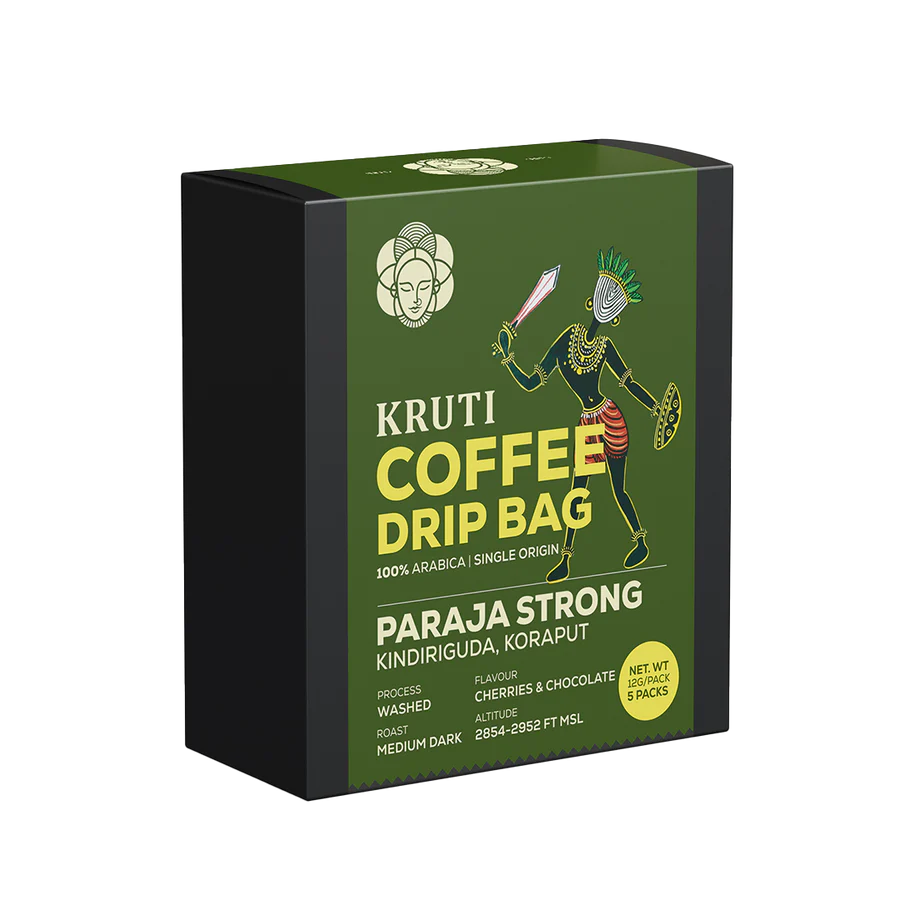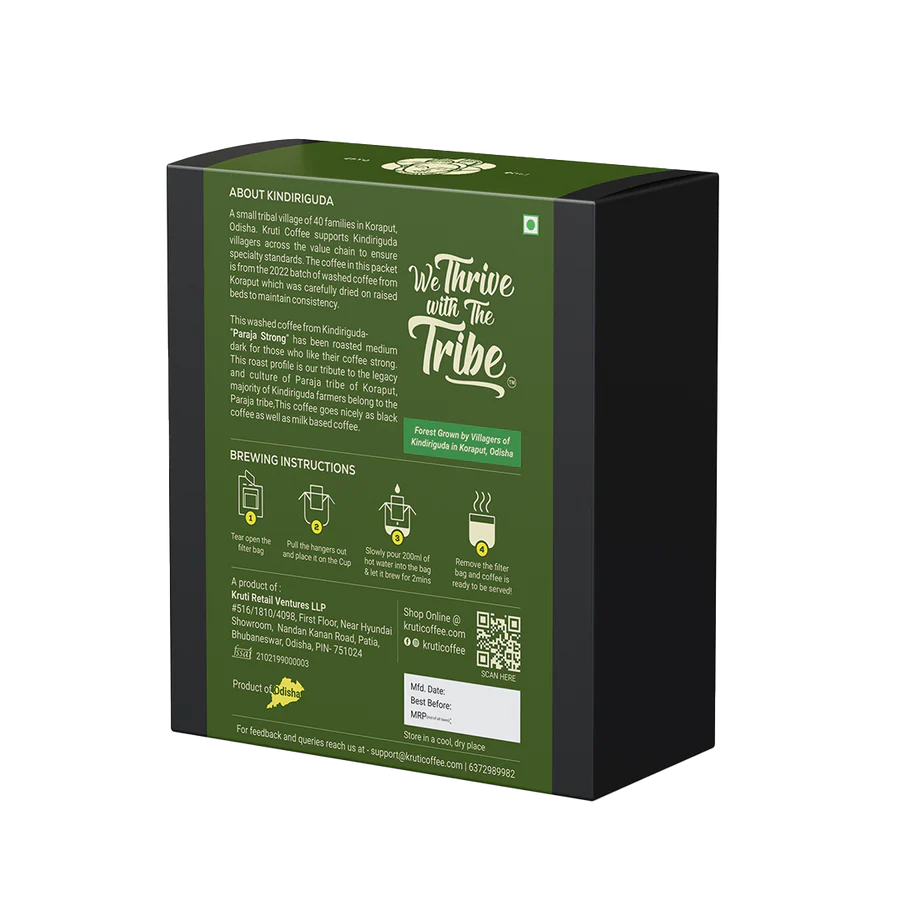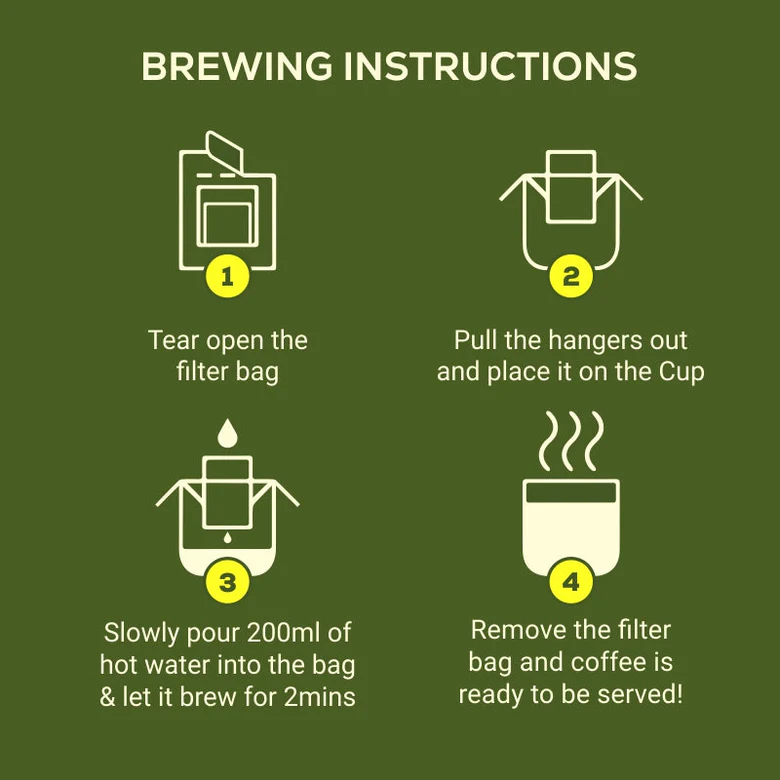Kruti Paraja Strong Drip Bag | Medium Dark – Pack of 5
₹240.0
-
Product Info
100% ARABICA | SINGLE ORIGIN
PROCESS: WASHED FLAVOUR: CHERRIES & CHOCOLATE
ROAST: MEDIUM DARK ALTITUDE: 2854-2952 FT MSL
ORIGIN: KINDIRIGUDA, KORAPUT
USP: FOREST GROWN, SHADE GROWN , TRIBAL GROWN
QUANTITY: 5 DRIP BAGS (EACH 12 GRAM)
These drip bags have been specially designed to make brewing easy for you at home or as you travel. Please refer packaging for brewing instruction.
This washed coffee from Kindiriguda- “Paraja Strong” has been roasted medium dark for those who like their coffee strong. This roast profile is our tribute to the legacy and culture of Paraja tribe of Koraput, majority of Kindiriguda farmers belong to the Paraja tribe This coffee goes nicely as black coffee as well as milk based coffee.
About Kindiriguda: A small tribal village of 40 families in Koraput, Odisha. Kruti Coffee supports Kindiriguda tribal coffee farmers across the value chain to ensure specialty standards are maintained throughout. The coffee in this packet is from the 2021-2022 batch of washed coffee from Koraput which was carefully dried on raised beds to maintain consistency.
- Description
- Additional information
- Reviews (0)
- Q & A
- Sustainability Remark
- More Offers
- Store Policies
- Inquiries
| brands | Kruti Coffee |
|---|
You must be logged in to post a review.
Q & A
Organic coffee is often considered more sustainable compared to conventional coffee farming practices. Here are several aspects that contribute to the sustainability of organic coffee:
Environmental Impact: Organic coffee is grown without the use of synthetic pesticides, herbicides, or fertilizers. Instead, farmers rely on natural methods such as composting, crop rotation, and biological pest control. This reduces the risk of chemical pollution, helps preserve biodiversity, and maintains soil health over the long term.
Soil Conservation: Organic coffee farming practices prioritize soil health and fertility. By avoiding synthetic inputs, organic farmers encourage the development of rich and fertile soils. This approach helps retain water, prevents erosion, and promotes the overall sustainability of the land.
Biodiversity Preservation: Organic coffee farms tend to be more biodiverse compared to conventional ones. By avoiding chemical inputs, organic farmers create a habitat that supports a wide range of plants, animals, and beneficial insects. This biodiversity helps maintain ecological balance, provides natural pest control, and contributes to the overall health of the ecosystem.
Water Conservation: Organic coffee farming often involves shade-grown methods. Shade trees provide a natural canopy that helps conserve water by reducing evaporation and retaining soil moisture. This approach also protects water sources, such as rivers and streams, from potential contamination by chemicals used in conventional farming.
Social Impact: Organic coffee farming often prioritizes fair trade practices and the well-being of farmers and workers. Many organic certifications have social criteria that ensure fair wages, safe working conditions, and community development. These practices contribute to the sustainability of the coffee industry by promoting social equity and supporting the livelihoods of coffee farmers.
While organic coffee offers several sustainability benefits, it's important to note that the overall sustainability of the coffee industry extends beyond organic farming practices. Additional factors such as transportation, energy use, packaging, and waste management also play a role. Therefore, a holistic approach that encompasses the entire supply chain is necessary to achieve a more sustainable coffee industry.
General Inquiries
There are no inquiries yet.




















Reviews
There are no reviews yet.